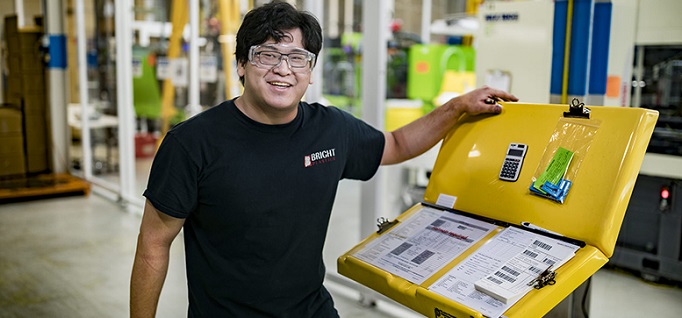Apprenticeship programs still going strong
By Ellie Ashford
July 15, 2020
Community colleges are working to ensure apprenticeship programs continue — with safety in mind.
The coronavirus pandemic has caused some community colleges and employers to temporarily suspend apprenticeship programs. Many of those programs, however, are going forward online or with accommodations to protect workers’ health.
The bulk of apprenticeship programs at the College of DuPage in Illinois are in manufacturing, and most participating companies have been essential so they are continuing to operate.
The college moved the instruction component for apprentices to a virtual format for the spring and summer terms, says Danielle Kuglin Seago, manager of COD’s Project Hire-Ed. The information session and introductory apprenticeship seminar course are now online, too.
During the initial wave of the pandemic, the college gave some apprentices in HVAC-R (heating, ventilation, air conditioning and refrigeration) the option to take a furlough. They are all now back at work, Kuglin Seago says.
Some of the manufacturers have slowed their workload, but when things get back to normal, they will quickly return to full capacity, she predicts.
COD is planning a hybrid option for fall courses but could easily revert to an all-online model, if necessary.
For current apprentices, the college is identifying coursework they can take during the fall without labs or minimal lab time, so their learning won’t be disrupted if the pandemic is still a factor, Kuglin Seago says.
Flexible learning plans
COD launched Project Hire-Ed this year to support COD-sponsored apprenticeship programs and serve as education partners for employer-sponsored apprenticeships. During its first year, Project Hire-Ed oversaw 14 apprentices at nine companies.
Most of the apprentices at COD are in industrial maintenance, facility maintenance, HVAC-R, welding, electromechanical technology, and computer numerical control (CNC) operations. The programs generally run two years.
Two COD apprentices started working this year at Mauser Packaging Solutions, an international company that makes large drums and containers for shipping liquids. Kuglin Seago expects the company will hire more apprentices this fall.
The company has implemented social distancing among employees and stepped up cleaning procedures. It requires face coverings and protective equipment for employees and bans employees from eating lunch with their coworkers.
Mauser pays the apprentices for a 40-hour work week, although eight of those hours are in class. Students who complete the program earn a certificate in industrial maintenance and credits that count toward an associate degree.
Pioneer Service Inc., a women-owned, minority-owned manufacturer that produces prototypes for aerospace, automotive, hydraulics and medical supply companies, is continuing to employ COD apprentices to work as CNC operators.
This fall, COD is starting an apprenticeship with a healthcare company in medical billing and coding.
“Employers need people with these skills to jump in quickly, as doctors’ offices are opening up,” Kuglin Seago says.
Front-line workers
The governor of Colorado approved a waiver allowing an apprenticeship program in medical assisting involving Arapahoe Community College (ACC) and Centura Health to continue because that work is essential, says Eric Dunker, associate vice president and dean of business, technology and workforce partnerships at ACC.
ACC suspended weekly in-person labs based at the college for a couple of weeks during the pandemic. However, apprentices continued to work 32 to 40 hours a week in Centura clinic, including helping with COVID-19 testing, Dunker says. The apprentices greet patients at the front door, take their temperature, and do everything except administer the actual test.
The on-campus labs have resumed with social distancing, staggered schedules and personal protective equipment. About 75 percent of the education component is done through competency-based online courses.
The program has trained more than 60 apprentices over the past two years to work on the front lines in healthcare. Dunker expects 13 or 14 students in the spring cohort will graduate this month with a certificate in medical assisting.
Despite the pandemic and the risk to healthcare workers, Dunker says, the program is more popular than ever. Typically, the program draws about 100 applicants, but 200 people applied for the summer cohort starting in July.
He attributes that interest to several factors: “The unemployment rate is dramatically higher. People are more interested in healthcare as a viable industry, and all the stories about first responders have given the industry a renewed focus.”
He adds that “people want to get their foot in the door at Centura,” which offers many opportunities for advancement.
There’s more to the story! Read the full article in CC Daily.


